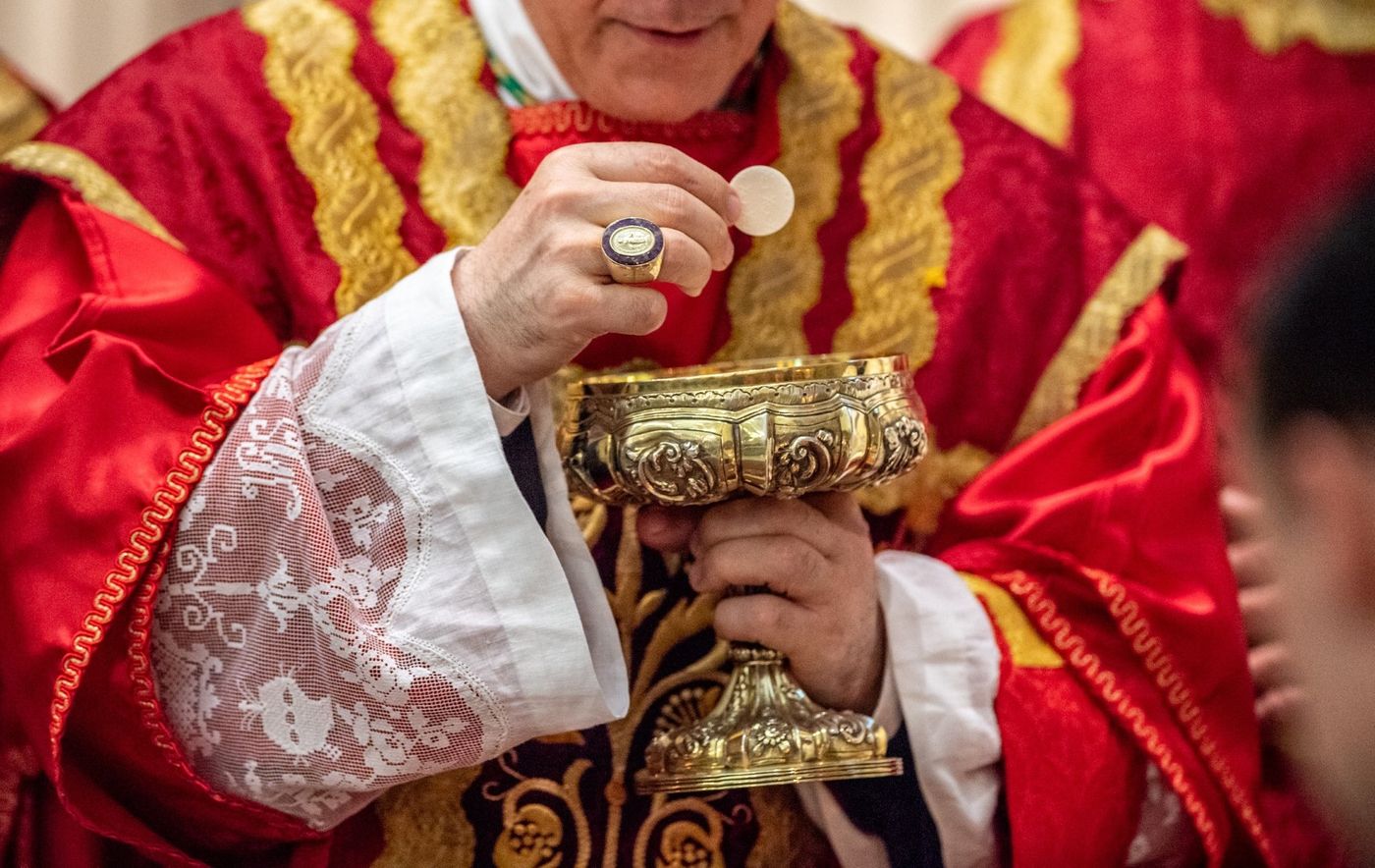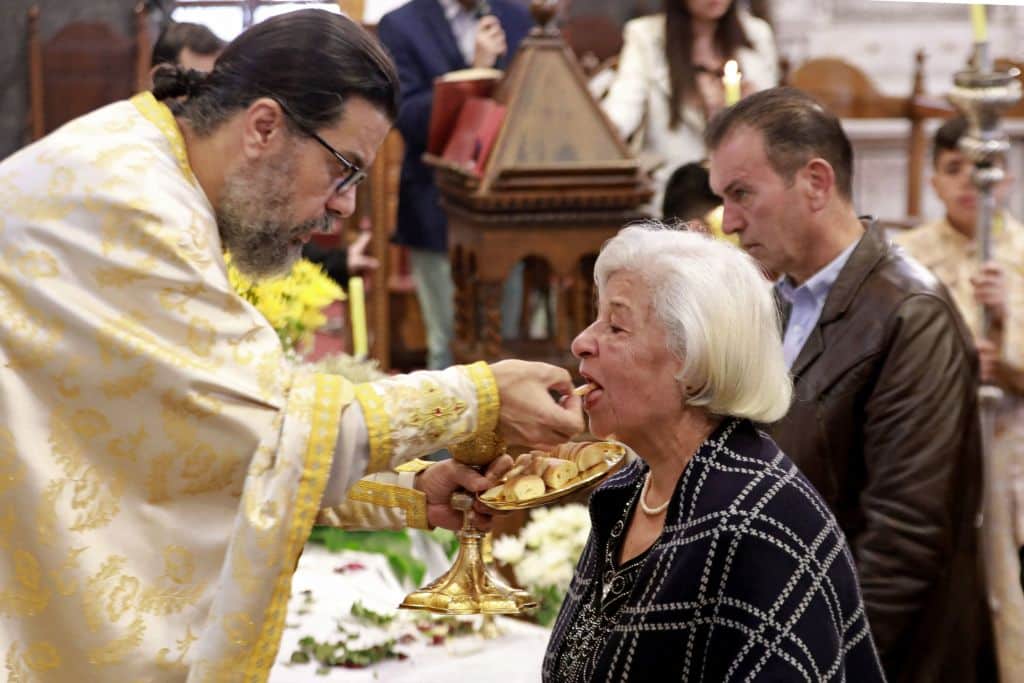A concerned Catholic: James and I divorced 20 years ago. I stopped going to Communion because I knew that divorced people aren’t supposed to receive Communion in the Catholic Church. I more or less stopped going to Mass too. However, my neighbour has been really kind. She says, because I have never been with anyone since, there is no problem about my receiving Communion, but I probably ought to go to Confession first. Is she right? And I am not at all sure about Confession.
Chaplain: You are correct that the Catholic Church is opposed to divorce. Or, to put it more positively, the Catholic Church believes very strongly in the value of marriage, to which divorce is opposed. To quote the Catechism of the Catholic Church (1605):
“Holy Scripture affirms that man and woman were created for one another: ‘It is not good that the man should be alone.’ The woman, ‘flesh of his flesh’, his equal, his nearest in all things, is given him by God as a ‘helpmate’... ‘Therefore, a man leaves his father and mother and cleaves to his wife, and they become one flesh.’ The Lord shows that this signifies an unbreakable union by recalling what the plan of the Creator had been ‘in the beginning’: ‘So they are no longer two, but one flesh.’”
The Catechism goes on to say: “Divorce is a grave offence against the natural law. It claims to break the contract, to which the spouses freely consented, to live with each other till death. Divorce does injury to the covenant of salvation, of which sacramental marriage is the sign…Divorce is immoral also because it introduces disorder into the family and into society.”
This being the case, it is inevitable that the Church regards divorce in a negative light. Nevertheless, it is also true that the Church – being a wise mother with over 2,000 years’ experience of human nature – recognises the reality of human frailty, and seeks to find ways for her children to remain in the path of salvation. Thus, the Church recognises that in certain cases, separation may be the only realistic option when a marriage has broken down.
This is especially the case when one partner is violent and separation is the only way to protect the injured spouse and any children. This is a fairly extreme case, but even in less dramatic situations the Church recognises that separation may be inevitable. The Church also acknowledges that – in these situations where a permanent separation has occurred – that some form of civil divorce may be necessary in order to protect the rights of all concerned. To quote the Catechism one last time:
“If civil divorce remains the only possible way of ensuring certain legal rights, the care of the children, or the protection of inheritance, it can be tolerated and does not constitute a moral offence.”
The Church recognises that separation is sometimes inevitable and, therefore, a civil divorce can be obtained without this being sinful. Nevertheless, even when the Church tolerates a separation or divorce, it does not permit the divorced persons to marry again, since this would be contrary to Christ’s express command in the Gospel. The only exception would be where the Church has granted a canonical annulment, in effect a declaration that the marriage was invalid due to some grave defect of matter or form. Once an annulment has been granted, the couple are free to remarry.
This brings us to your own situation. Although you do not give the details, you do say that you have not entered into any new relationship. This being so, there seems no reason why you should not be attending Mass regularly and receiving Holy Communion – in fact, it would be a good thing to do. However, as your neighbour has wisely pointed out, you should also make a good Confession before you begin going back to Holy Communion.
This is not just because of your divorce (although this is something you should mention to the priest) but also because every one of us is a sinner in need of forgiveness. The Church requires us to confess all grave sins once a year, and encourages us to go to Confession more regularly as a means to advance in the spiritual life. You will be able to establish whatever pattern is best for you once you have returned to the regular reception of the Sacraments.
I encourage you to return to Mass and Communion, and to go to Confession as soon as possible. You may feel rather nervous. This is natural – but do not let nerves discourage you. I am sure you will find the priest only too willing to assist and to help you along if you are a bit rusty as to the correct procedure!
You should mention your divorce in Confession, and if appropriate you may wish to ask the priest about the possibility of obtaining an annulment (although this is a conversation to pursue later, outside of the Confessional).
Thank you for raising this issue. It is something which affects many Catholics. It is important for them to know that they are still able to attend Mass and to receive Holy Communion – and that this is a good thing to do.
I hope that returning to the regular reception of the Sacraments will bring you both healing and peace.
(Image courtesy John Aron.)
This article appears in the September 2024 edition of the Catholic Herald. To subscribe to our award-winning, thought-provoking magazine and have independent and high-calibre counter-cultural and orthodox Catholic journalism delivered to your door anywhere in the world click HERE.
<strong>A concerned Catholic</strong>: James and I divorced 20 years ago. I stopped going to Communion because I knew that divorced people aren’t supposed to receive Communion in the Catholic Church. I more or less stopped going to Mass too. However, my neighbour has been really kind. She says, because I have never been with anyone since, there is no problem about my receiving Communion, but I probably ought to go to Confession first. Is she right? And I am not at all sure about Confession.
<strong>Chaplain</strong>: You are correct that the Catholic Church is opposed to divorce. Or, to put it more positively, the Catholic Church believes very strongly in the value of marriage, to which divorce is opposed. To quote the <em>Catechism of the Catholic Church</em> (1605):
“Holy Scripture affirms that man and woman were created for one another: ‘It is not good that the man should be alone.’ The woman, ‘flesh of his flesh’, his equal, his nearest in all things, is given him by God as a ‘helpmate’... ‘Therefore, a man leaves his father and mother and cleaves to his wife, and they become one flesh.’ The Lord shows that this signifies an unbreakable union by recalling what the plan of the Creator had been ‘in the beginning’: ‘So they are no longer two, but one flesh.’”
The <em>Catechism</em> goes on to say: “Divorce is a grave offence against the natural law. It claims to break the contract, to which the spouses freely consented, to live with each other till death. Divorce does injury to the covenant of salvation, of which sacramental marriage is the sign…Divorce is immoral also because it introduces disorder into the family and into society.”
This being the case, it is inevitable that the Church regards divorce in a negative light. Nevertheless, it is also true that the Church – being a wise mother with over 2,000 years’ experience of human nature – recognises the reality of human frailty, and seeks to find ways for her children to remain in the path of salvation. Thus, the Church recognises that in certain cases, separation may be the only realistic option when a marriage has broken down.
This is especially the case when one partner is violent and separation is the only way to protect the injured spouse and any children. This is a fairly extreme case, but even in less dramatic situations the Church recognises that separation may be inevitable. The Church also acknowledges that – in these situations where a permanent separation has occurred – that some form of civil divorce may be necessary in order to protect the rights of all concerned. To quote the <em>Catechism</em> one last time:
“If civil divorce remains the only possible way of ensuring certain legal rights, the care of the children, or the protection of inheritance, it can be tolerated and does not constitute a moral offence.”
The Church recognises that separation is sometimes inevitable and, therefore, a civil divorce can be obtained without this being sinful. Nevertheless, even when the Church tolerates a separation or divorce, it does not permit the divorced persons to marry again, since this would be contrary to Christ’s express command in the Gospel. The only exception would be where the Church has granted a canonical annulment, in effect a declaration that the marriage was invalid due to some grave defect of matter or form. Once an annulment has been granted, the couple are free to remarry.
This brings us to your own situation. Although you do not give the details, you do say that you have not entered into any new relationship. This being so, there seems no reason why you should not be attending Mass regularly and receiving Holy Communion – in fact, it would be a good thing to do. However, as your neighbour has wisely pointed out, you should also make a good Confession before you begin going back to Holy Communion.
This is not just because of your divorce (although this is something you should mention to the priest) but also because every one of us is a sinner in need of forgiveness. The Church requires us to confess all grave sins once a year, and encourages us to go to Confession more regularly as a means to advance in the spiritual life. You will be able to establish whatever pattern is best for you once you have returned to the regular reception of the Sacraments.
I encourage you to return to Mass and Communion, and to go to Confession as soon as possible. You may feel rather nervous. This is natural – but do not let nerves discourage you. I am sure you will find the priest only too willing to assist and to help you along if you are a bit rusty as to the correct procedure!
You should mention your divorce in Confession, and if appropriate you may wish to ask the priest about the possibility of obtaining an annulment (although this is a conversation to pursue later, outside of the Confessional).
Thank you for raising this issue. It is something which affects many Catholics. It is important for them to know that they are still able to attend Mass and to receive Holy Communion – and that this is a good thing to do.
I hope that returning to the regular reception of the Sacraments will bring you both healing and peace.
<em>(Image courtesy John Aron.)</em>
<strong><strong>This article appears in the September 2024 edition of the <em>Catholic Herald</em>. To subscribe to our award-winning, thought-provoking magazine and have independent and high-calibre counter-cultural and orthodox Catholic journalism delivered to your door anywhere in the world click <a href="https://catholicherald.co.uk/subscribe/?swcfpc=1"><mark style="background-color:rgba(0, 0, 0, 0)" class="has-inline-color has-vivid-cyan-blue-color">HERE</mark></a></strong></strong>.


















